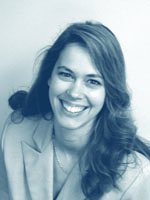 A primary question of prospective students is, "What can I do with a degree in English?" Here is one example of sort of thing graduates of our programs do when they graduate.
A primary question of prospective students is, "What can I do with a degree in English?" Here is one example of sort of thing graduates of our programs do when they graduate.
Rebecca Frisbee joined the University of Missouri – Rolla’s Publications Relations Office in 1992 after graduating with a BA in English in 1990. Rebecca has been with Publications Relations for 15 years. In 1995, Rebecca became manager of the department, and art and production editor for the MSM-UMR Magazine. In 2005, she led the redesign efforts of the alumni magazine when we changed its name to UMR Magazine.
Rebecca will begin her new duties as manager of marketing for the School of Extended Learning on Oct. 1. It covers Distance and Continuing Education, International Affairs, and the Engineering Education Center in St. Louis. On behalf of the Department of English and Technical Communication — Congratulations, Rebecca!
Promotion for Rebecca Frisbee
New and Better Computing
The English Department began developing ideas for a writing center in the 1990s. Dr. Elizabeth Cummins and Dr. Larry Vonalt were important forces behind the department’s request for a Center for Writing Technologies. Their project was finally realized in the establishment of the Writing Across the Curriculum Program, which includes the Dr. Beverley Moeller Writing Studio and the Center for Writing Technologies.
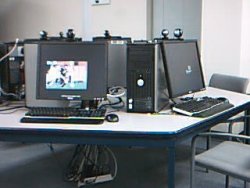
A pod of new computers in the Writing Center
Photo taken with the webcam on one of the new computers
While administratively separate from the Department of English and Technical Communication, the Writing Center and the department are close allies, especially concerning the Center for Writing Technologies (usually called "The Writing Center").
This summer, the department arrived at a plan to share licensing fees for new and upgraded hardware and software. I’m sure you are aware of the rate of change of software and hardware. To best serve our students, especially majors in Technical Communication, we need the best equipment and software available. The Writing Center was updated this August.
The updates this summer make the Writing Center UMR’s premier authoring lab. It was designed by a committee of faculty and staff from various departments: Todd Kreuger (Information Technology [IT]), Connie Melone (IT), Jim Turner (IT), John Sequin (Library), Kate Drowne (English and Technical Communication), Richard Hall (Information Science & Technology), and Ed Malone (English and Technical Communication). The new equipment and software were paid for by IT, Center for Technology Enhanced Learning, and English and Technical Communication
In the future, this lab will accommodate such courses as Web-Based Communication and Multimedia Development and Design. In TCH COM classes this semester, students are authoring help systems with RoboHelp and creating books with FrameMaker; next semester, they will be conducting usability tests and creating tutorials with Camtasia.
The lab has extended hours this semester (6-9 M-Th and 12-9 on Sundays) and hired a lab monitor to help patrons.
The new and updated software is available in two other locations on campus. In Computer Science 207, all of the Adobe programs — except RoboHelp — are available 24/7. One of the machines in the library also has all of the Adobe programs — including RoboHelp — so that a student can complete assignments on Friday evenings or
Saturdays. The library also purchased a collection of Adobe classroom-in-a-book tutorials for the specific versions of Adobe programs we have and other tutorials for RoboHelp, Camtasia, and so on.
Online Scholarship
One consequence of the increasing use of the World Wide Web is the migration of scholarship to online venues. Internet publication has many advantages for scholarly and creative work, especially ease of access for millions of people.
Dr Elizabeth Cummins, Professor Emeritus of English and Technical Communication, is one of the scholars whose work is being published online. Her Judith Merrill: A Primary and Secondary Bibliography has just been published by the Center for the Bibliography of Science Fiction and Fantasy at Texas A&M University.
The site’s Introduction explains the background: the loss of print publishers for scholarly bibliographies and yet the continuing need scholars have for such bibliographies. Sponsored "by the Science Fiction Research Association, The International Association for the Fantastic in the Arts, Extrapolation magazine, and the Science Fiction and Fantasy Research Collection, Cushing Library, Texas A&M University," the Center is a fully qualified scholarly publisher
Earlier in the history of publication on the World Wide Web, many questioned whether such publication really counts as "scholarly," as legitimate publication, or as a kind of vanity publishing. Like other Web publishers, the Center for the Bibliography of Science Fiction and Fantasy qualifies as a full-fledged scholarly publisher. The bibliographies it publishes are reviewed by a qualified editorial board just as they would be for hard copy publishers.
Congratulations to Dr. Cummins on the latest publication of a labor of scholarly love. Judith Merrill is a crucial editor and writer in SF; now scholars around the world have ready access to this outstanding bibliography.
New Roles for Two Faculty Members
Beginning with the fall 2007 semester, Dr. Kris Swenson and Dr. Ed Malone, will each add a new role to their responsibilities in the Department of English and Technical Communication. As the number of students increases, managing the courses they take becomes more complex. The department itself is changing in response to changes in the student body and to changes in the campus. In addition, our BS and MS degrees in Technical Communication are not quite two years old: these programs need attention and effort to develop most effectively.
As Coordinator of Writing Courses, Dr. Swenson will oversee the Department’s English 20 (Exposition and Argumentation) and English 60 (Writing and Research). English 20 is "freshman comp," an important course taken by almost all incoming freshman. Her duties also include working with the faculty teaching these courses and coordinating policies and practices for the courses.
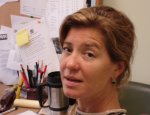
Dr. Kris Swenson
As Director of Technical Communication, Dr. Malone will work extensively with the graduate students on issues ranging from admission to keeping statistics on their test scores. Dr. Malone will also aid in recruiting both undergraduate and graduate students for the technical communication programs.
Dr. Ed Malone
For my part as chair, I welcome these new roles for Dr. Swenson and Dr. Malone. The department will function more effectively because of their contributions. Thanks are due the Provost, Dr. W. Kent Wray, and the Chancellor, Dr. Jack Carney, for making these new roles possible.
Celebration
The fall semester has well and truly begun. The first wave of student questions and dilemmas is over. (That first wave ranges from trying to find a classroom to trying to get into a class to finding an instructor.) For all that the university has over 1200 new freshman, there were fewer problems of this kind this fall.
Now that enrollment and class schedules have pretty well settled down, faculty, students, and staff can take stock and focus fully on the tasks of teaching, learning, and facilitating. The Department of English and Technical Communication sponsored a "Welcome Back" reception on Tuesday, August 28. Students and faculty from several departments mingled and ate goodies. 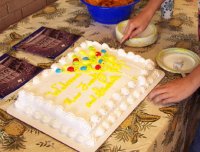 In this photo, Erin Cotita, English major and department student assistant, prepares to cut the cake for serving.
In this photo, Erin Cotita, English major and department student assistant, prepares to cut the cake for serving.
The reception ran from 1:00 to 2:30; those attending did more than eat, as shown in this photo of students (Irangi, Li and Tommy) talking with Professor Emeritus, Nick Knight, and parent, Glenn Cotita. 
Together with the break in the heat we’re experiencing (highs of 85 F are much more pleasant than highs of 105 F) and the relatively smooth start of a new semester, this reception put, so to speak, the icing on the cake. (Or the dip on the crudités. if you will.)
Reading, Writing, and Kimchi
Elizabeth Richardson ("Libby") is teaching English in The Republic of Korea this year. She has just begun her duties at Avalon Education in Suwon City, where she is Head Foreign Teacher. The title basically means that Libby is the go between for the foreign teachers (there are 8 right now including her) and the Korean administrators. Any information for or complaints from the foreign teachers get filtered through her first.

Photograph by Elizabeth Richardson: the building where she works.
Libby is also responsible for editing any English documents, training new teachers, and substituting if another foreign teacher is ill. She also administers the oral placement exams, grades the essay placement exams, and delegates other work to the other foreign teachers. She also teaches speaking, reading, and writing classes for various levels. — teaching the highest level middle school students writing, the mid-level middle school students reading, and the lower level middle school students speaking.
In addition, Libby teaches one elementary class. This class is mainly a mixture of speaking, reading, and writing.
Libby says, "So I’m pretty busy so far and classes just started today! I’ve been here just over two weeks and I’ve really enjoyed myself so far. All of the Korean teachers here are super nice and very helpful. All of the foreign teachers get along and have pretty diverse backgrounds. The amount of importance the culture places on education is just amazing, especially considering that we’re in session from 4 p.m. – 10:40 p.m. after regular school has let out."
Between Wildfire and Hailstorm
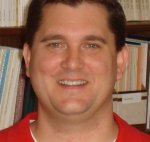 The Department of English and Technical Communication welcomes David Wright as a new Assistant Professor. Dr. Wright completed his PhD. last May at Oklahoma State University.
The Department of English and Technical Communication welcomes David Wright as a new Assistant Professor. Dr. Wright completed his PhD. last May at Oklahoma State University.
Dr. Wright shares this story of an unusual event:
Once, in South Dakota, I was caught between an wildfire and a massive thunderstorm. On the road ahead, we could see flames and massive amounts of smoke reaching the sky. Behind us was a wall cloud that looked like it covered the world. Since we couldn’t drive into the smoke and fire, we had to pull over and wait for the hail and rain that was creeping in behind to overtake us and extinguish the wildfire. Believe me, it was quite a wild ride. While there, we watched a mountain lion stalk an antelope across the valley below the road.
He adds, "Sounds like a tall tale, doesn’t it?" Whether tall or not, it’s a good tale.
Dr. Wright grew up in Oklahoma, where he learned to enjoy trout fishing, golfing, playing and recording music, and college athletics of all kinds. He has worked for NASA, the State of Oklahoma, in the software industry, and at one time was a member of a band that traveled a great deal and played lots of "really fine establishments." As part of his dissertation research into technology diffusion and as part of his work in the software industry, Dr. Wright visited livestock auctions from Texas to North Dakota (and everywhere in between) to research the cattle industry’s technological readiness for animal identification processes, both hardware and software.
I’m going to guess that many of those livestock auctions weren’t all that far from the "fine establishments" where his band played at an earlier stage of his life. The department is glad to have Dr. Wright join us; we hope you’ll meet him, perhaps in one of his classes or through reading his research.
Student & Faculty Research
We at UMR — faculty and students alike — enjoy several research opportunities.
Dr. Ed Malone (Assistant Professor of English and technical communication and Director of technical communication) and Tara Gosnell (graduate student in technical communication) have recently received a grant for a project titled "The Role of Historical Studies in Technical Communication Curricula." The grant comes from the Council of Programs in Technical and Scientific Communication, of which both Prof. Malone and Ms. Gosnell are members.
A research project such as this allows the student to hone research skills and participate as an investigator in the faculty member’s professional research. (The history of technical communication is a main emphasis of Dr. Malone’s research.)
Prof. Malone and Ms. Gosnell have been meeting once a week this summer to write, design, and
test an online survey of technical communication program administrators and faculty. They plan to administer the survey in early September. They plan to present the results of the survey in an article.
In an article that will soon appear in IEEE Transactions on Professional Communication, Prof. Malone notes that at least 200 historical studies have been published in the top five technical communication journals since 1990. These publications indicate an interest in and recognition of the value of historical research in technical communication. The research project will explore how academic programs in technical communication make use of the historical research.
Here are some examples of questions from the survey:
- In your opinion, should a technical communication program offer, on a
regular basis, a course devoted entirely to the history of technical
communication? - Are students in your program expected to apply their knowledge of the
history of technical communication? - If so, how are they expected to apply their knowledge?
- What is the value of historical studies to students of technical communication?
- In your opinion, what benefits (if any) does a technical communication
student derive from studying the history of technical communication?
The results of the survey will enable program administrators and faculty to make better-informed decisions about the role that historical studies should play in their curricula. The findings may also benefit technical communication scholars who are researching the history of technical communication by giving them feedback about the value of their research.
Gold & Green Balloons
This week temperatures are to be well over one hundred. Despite the heat, a number of new freshmen and family members were on the UMR campus this morning. Today (Saturday, August 11) is the last PRO day for the 2007/2008 academic year. PRO is an acronym for "Preview, Registration, and Orientation." Students who attend a PRO session experience a variety of activities, including placement testing and registration for fall courses.
I went to PRO this morning to help a new student in English Education register for her fall courses. The opening activity occurred in St Pat’s Ballroom A in the Havener Center. At a couple of tables in the hall, PRO staff and student leaders answered questions and directed students and their parents into the opening activity. There were outbursts of laughter from the ballroom, so the activity must’ve been amusing as well as informative.
PRO events are cheerful — the student PRO leaders wear green shirts with gold trim; gold and green balloons float from the tables and, out on the campus, from the directional signs placed to guide students and their families on their treks across campus. ("Treks" because even at 10:00 AM today, it was very hot, with an intense sun and no breeze.) The student and I put together a good schedule for her to start her college career.
Each department has an advisor designated to advise PRO students. I did this for a number of years and enjoyed it. The PRO advisor gets to be the student’s initial contact with the specifics of the department’s academic program. The advisor usually can chat with the student, getting to know him or her a little better. Sometimes, the PRO advisor meets the student’s parents. Even briefly meeting the parents gives the advisor a sense of the student’s origins. While a young person almost always leaves home to go to college, taking the first steps in becoming an independent adult, faculty members too often see students in isolation from their origins. Having met one or both parents gives the faculty member a sense of who supports and encourages the student’s entering college.
The campus still isn’t fully populated yet. Saturday’s freshmen (65-70) are the first trickle of the flood to come.
Frequency of Posts
If you’re keeping track, my commitment is now a minimum of one entry a week, posted over the weekend. Time-constraints, as well as the need to find topics, make more than one unlikely for many weeks. If you are reading this blog regularly, thank you.
I expect to post an entry later today or tomorrow.